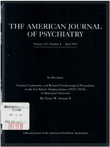Anger attacks in unipolar depression, Part 1: Clinical correlates and response to fluoxetine treatment
Abstract
OBJECTIVE: Anger attacks are sudden, intense spells of anger associated with a surge of autonomic arousal including such symptoms as tachycardia, sweating, flushing, and a feeling of being out of control. The purpose of this study was to determine whether depressed patients with and without anger attacks exhibit distinct psychological characteristics and whether these attacks respond to treatment with fluoxetine. METHOD: The Anger Attacks Questionnaire, the Hamilton Rating Scale for Depression, the Symptom Questionnaire, and the Cook- Medley Hostility Scale were among the scales administered at the Depression Research Program of the Clinical Psychopharmacology Unit at the Massachusetts General Hospital to 127 medication-free outpatients with major depression and to 85 of these patients after 8 weeks of open treatment with a fixed dose (20 mg/day) of fluoxetine. RESULTS: At baseline, 44% of the depressed outpatients reported having anger attacks; these patients had significantly higher scores on measures of anxiety, somatization, and state and trait hostility than did the subjects who did not exhibit such attacks. After treatment, there were significant reductions in these measures, and the anger attacks disappeared in the majority (71%) of the patients who had previously reported them. There was a trend toward greater overall clinical improvement for patients with anger attacks than for patients without them. CONCLUSIONS: This study identified a subgroup of highly irritable and hostile depressed patients who report the presence of anger attacks and have a psychological profile distinct from that of depressed patients without anger attacks. Furthermore, fluoxetine treatment appears to be beneficial in reducing anger and hostility in these patients.
Access content
To read the fulltext, please use one of the options below to sign in or purchase access.- Personal login
- Institutional Login
- Sign in via OpenAthens
- Register for access
-
Please login/register if you wish to pair your device and check access availability.
Not a subscriber?
PsychiatryOnline subscription options offer access to the DSM-5 library, books, journals, CME, and patient resources. This all-in-one virtual library provides psychiatrists and mental health professionals with key resources for diagnosis, treatment, research, and professional development.
Need more help? PsychiatryOnline Customer Service may be reached by emailing [email protected] or by calling 800-368-5777 (in the U.S.) or 703-907-7322 (outside the U.S.).



